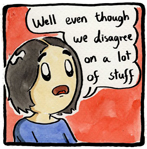|
What's causing the """ Why, 5G of course. https://www.lewrockwell.com/2020/03/jon-rappoport/5g-and-the-china-epidemic/ posted:How much 5G is currently deployed in Wuhan, which is said to be the initial Chinese center for 5G deployment? Wuhan, of course, has been called “the epicenter of the coronavirus epidemic.” If 2018 and 2019 5G predictions are close to accurate, the answer would be: a lot. "the lack of open debate is a sign that it's being suppressed"
|
|
|
|

|
| # ? Jun 3, 2024 04:24 |
|
The reason you know this is wrong isn't because obviously Coronavirus is a virus and not a syndrome from high-speed wi-fi, but because if it was the result of a corporate project making a public good like the air into a health hazard, then a real libertarian would defend their right to do so to the death, at best suggesting that the affected people should privately boycott the business until they change their practices of their own accord.
|
|
|
|
SlothfulCobra posted:The reason you know this is wrong isn't because obviously Coronavirus is a virus and not a syndrome from high-speed wi-fi, but because if it was the result of a corporate project making a public good like the air into a health hazard, then a real libertarian would defend their right to do so to the death, at best suggesting that the affected people should privately boycott the business until they change their practices of their own accord. Why didn't the people in Wuhan just sell their homes and move before the outbreak if it was going to be so dangerous to live there
|
|
|
|
SlothfulCobra posted:Thomas Midgley also suffered horribly from lead poisoning as a result of creating and working with leaded gasoline, and he had to take vacations out to medical facilities to try curing his lead poisoning. He actually came back from one of those vacations to testify in court that leaded gasoline was perfectly fine and not hazardous by pouring it all over his hands and inhaling its fumes, and then going back to continue treatment for lead poisoning. A real piece of work. To be fair 99% of the threat of disaster in Y2K was overblown. People were seriously assuming things like literally all of the nukes would launch because ???.
|
|
|
|
ToxicSlurpee posted:To be fair 99% of the threat of disaster in Y2K was overblown. People were seriously assuming things like literally all of the nukes would launch because ???. the worst thing that would've happened on y2k was the widespread disruption of global capitalism due to faulty computers, which in hindsight would've been the best thing
|
|
|
|
SlothfulCobra posted:The reason you know this is wrong isn't because obviously Coronavirus is a virus and not a syndrome from high-speed wi-fi, but because if it was the result of a corporate project making a public good like the air into a health hazard, then a real libertarian would defend their right to do so to the death, at best suggesting that the affected people should privately boycott the business until they change their practices of their own accord. https://twitter.com/CasPiancey/status/1234604651133030401
|
|
|
|
Here are a few things that I find frustrating about Progressive (mis)conceptions about libertarianism. First there is the constant conflation of libertarian advocacy of free markets, property rights and a Stateless society predicated on libertarian law (self-ownership, the non-aggression principle, etc) with a defense of Capitalists as a class of people. These are not remotely the same things. In fact, it is most often the Capitalist class who lobby the State for more regulations, more special privileges, more monopoly protections and no-bid contracts. Libertarian reforms are most likely to be against the interests of the wealthy in today's nominally "capitalist" economies and accrue to the benefit of the poor and middle classes. Similarly, "neo-liberalism" is not the same thing as libertarianism. Not even close. Neo-liberalism is corporate State fascism, military imperialism, Fed bailouts and mass exploitation. It is often sold using terms like "free markets", "liberty" and other words that are similar to terms used by libertarians but this is subterfuge. As I've mentioned before, classical liberals like Adam Smith were highly critical of business interests who seek to create cartels and exploit the masses. It was Smith who said: “People of the same trade seldom meet together, even for merriment and diversion, but the conversation ends in a conspiracy against the public, or in some contrivance to raise prices.” Libertarians believe in class, exploitation and the importance of class consciousness. Libertarians first developed the concepts of class analysis and the concept of class exploitation, which Marx stole. He proceeded to confuse the concept and misdirect the appropriate attention away from the real culprit. Libertarians further developed their theories of class and exploitation throughout the 20th century. The proper analysis of class and exploitation is that, on the one hand, you have all groups of people who benefit from political (State) power and, on the other hand, all groups who are tyrannized and exploited by State power. The groups who benefit from State power are often, though not exclusively, people who comprise the capitalist class. Some may have originally acquired this wealth legitimately, others may have stolen their wealth or acquired it through various immoral means, but by and large this class of people want to protect their wealth by any means. Historically, the most secure and indeed the only long-term means of creating and maintaining a cartel or monopoly is through the use of State power. So that is what a large percentage of the capitalist class does. So it is absolutely legitimate to criticize these people for their crimes, for their promotion of imperialism and exploitation. Classical liberals and true libertarians have never been shy about criticizing grifters, shysters, rent-seekers and disreputable people among the class of businessmen. The distinction between the libertarian conception of class and exploitation and the (flawed) Marxist conception, is that we understand that the engine of exploitation is State power, whoever happens to be wielding that power. In a clean version of laissez-faire capitalism with accompanying libertarian legal enforcement, exploitation does not occur. A worker is not exploited because a business-owner makes a profit, just as the business-owner is not exploited if he takes loses that are not shared among the workers. Risk-taking has a cost, and present goods have more value than the same amount of goods at some future date. A prosperous society that lifts up the poor and middle classes, protects the environment and permits peaceful coexistence requires a free market in capital goods and consumer goods, decentralized political power and private property rights. Such a society is perfectly welcoming to worker-owned communes and localized communities that operate non-hierarchically. As long as such arrangements are voluntary, there's no problem whatsoever. There is much to criticize about neo-liberalism, imperialism, Corporate Fascism and many of the things that people are so angry about. But Marxist reforms are a dead end. They won't achieve the results you imagine they will. Anti-Statist reforms along the lines of radical libertarianism and anarchism consistent with property rights and self-ownership are our best option as an alternative to the madness foisted upon us by our Ruling Class.
|
|
|
|
I have an open-ended question for anyone here. To what extent do you believe in the principle of egalitarianism? What does that term mean to you? This principle is different in my mind from a goal such as "I want to help the poor", or "I want society to be better off overall". Both of those goals are worthy and laudable. But they don't require a comparison of the people you're trying to help to some other group of people. It is obvious that people are radically different from one another, and thus "unequal". This is the nature of reality. And in fact it is human inequality that makes each person unique and special. Some are extremely intelligent, some are mentally retarded. Some are beautiful and others ugly. Some have natural talents in certain areas that others lack. Some are disciplined and work hard, while others are lazy. All this is totally obvious. Furthermore "equality" is a slippery concept that is easily exploited by demagogues and tyrants who desire to exercise political power. My political aim is not greater equality per se, but justice and a meritocracy where each person's unique talents and abilities take them as far as they are able to go without anyone interfering. The caveat of course being that in the pursuit of their passions, people must conform to the non-aggression principle and libertarian law in general. I fully expect that a libertarian society will be less unequal than today's society. This is because the greatest inequality that exists in any society is between those who benefit from State power and those who are victimized, exploited and brutalized by State power. The people who profit from their connections to the State are not the most talented, the most intelligent or the most ethical. They are the most duplicitous, the most vain, and the most unethical. Libertarians are trying to pursue goals that are consistent with reality and human nature. Some people on the Left who try to pursue a goal of radical egalitarianism are pushing a principle so contrary to reality that, if pushed far enough, results in absolute catastrophe. In a free society people will be materially unequal, but legally equal. Everyone will have equal rights to self-ownership, private property and the right to be left alone and safe from all aggression. The material inequality will reflect people's natural differences, which will manifest in a division of labor where society as a whole will be far wealthier overall than in any competing political system. But enough about a libertarian society. I want to know whether you consider the principle of egalitarianism per se as a noble goal. And how do you reconcile the fact that the use of the State to reduce inequality necessarily empowers a State bureaucracy that is necessarily privileged and unequal in relation to the rest of society?
|
|
|
|
polymathy posted:The caveat of course being that in the pursuit of their passions, people must conform to the non-aggression principle and libertarian law in general. I got as far and this and I'm dying to know: who will enforce this libertarian law? Sounds to me like you want to appeal to TYRANNY to force me to not be aggressive.
|
|
|
|
polymathy posted:It was Smith who said: “People of the same trade seldom meet together, even for merriment and diversion, but the conversation ends in a conspiracy against the public, or in some contrivance to raise prices.” You don't need to quote some dipshit just to tell us you think unions are the devil. We already knew that. polymathy posted:The people who profit from their connections to the State are not the most talented, the most intelligent or the most ethical. They are the most duplicitous, the most vain, and the most unethical. You also didn't need to reiterate that you think being handicapped or disabled is a moral failing and should be punished. Again, we already knew that! Who What Now fucked around with this message at 10:04 on Mar 9, 2020 |
|
|
|
Rushputin posted:I got as far and this and I'm dying to know: who will enforce this libertarian law? The question of who will enforce the law is a practical matter and a separate discussion. The first question is a philosophical question, which is "what should the law be?". My point is that egalitarianism is not a good principle and in fact is contrary to the nature of reality. I accept the existence if inequality in nature and I don't rebel against it. I want people to use their unique talents and be as accomplished and successful as they can be, provided they act peacefully. It's not tyranny to "force" people not to be aggressive. It's not tyranny to enforce just laws. A limited national State could enforce laws against aggression. A local government could enforce such laws. Or a private security service could enforce such laws. It doesn't much matter to me. The point is that the enforcement of such a law is just and necessary for a civilized society.
|
|
|
|
Who What Now posted:You don't need to quote some dipshit just to tell us you think unions are the devil. We already knew that. You took both statements in precisely the wrong way. First, Adam Smith was clearly talking about businessmen and business leaders. Not unions. He was referring to the fact that businessmen often conspire with each other to form cartels to the detriment of consumers. You would think that a statement such as this would have appeal to people on the Left. Even Noam Chomsky has had complimentary things to say about Adam Smith. Second, I wasn't referring to people on food stamps or receiving disability. I don't think being handicapped or impaired, or even just unlucky is a moral failing. I was referring to politicians and special interests who move up the ranks into positions of power within the State bureaucracy. The worst tend to rise to the top in politics. I don't begrudge anyone for receiving disability. I don't even much care if people receive welfare or food stamps. I think there are better ways to help the poor and handicapped but people have to exist in the society as it is, not in some theoretical society that doesn't currently exist. Way to take everything in the most uncharitable and most uncomprehending way possible though.
|
|
|
|
we have democracy and it puts bad people up top, better abolish it and let benevolent corporate overlords do all the governing
|
|
|
|
polymathy posted:Libertarians first developed the concepts of class analysis and the concept of class exploitation, which Marx stole. He proceeded to confuse the concept and misdirect the appropriate attention away from the real culprit. Libertarians further developed their theories of class and exploitation throughout the 20th century. I also see hardly anything beyond a token amount of Georgism being said about the fact that the overwhelming majority of our land (and by extension the properties upon it) were allocated by government or regal theft. There can be no liberty without the returning of common lands to the commons, and as such lands were taken by aggression, it's no foul play to use force to return them, something that most pre-Marx libertarians understood, but almost no post-Rothbard ones do.
|
|
|
|
i can respect cutting out the middle man from regulatory capture and just letting the megacorps assert their sovereignty outright, actually
|
|
|
|
polymathy posted:The question of who will enforce the law is a practical matter and a separate discussion. Yet it's what I asked. But I guess "practical matters are a separate discussion" is a good summary of libertarian thought. You seem to contradict your principle of the State being a unique evil and say that some laws and their enforcement are obviously necessary. I guess that leads to the follow-up question: at what point does the good, libertarian state turn into the evil tyrannical State? Will any politician (or whatever you want to call them to pretend you don't have a state) who suggests laws and measures based on solidarity and helping people out be barred from his position? Who defines what "aggression" is? And since you put "force" in scare quotes, what word would you use for someone making me not do something I want to do?
|
|
|
|
Ah, good, you're back, and just like last time you've decided to come in and try to declare what the topic is rather than responding to what was posted. To wit,Somfin posted:Also, please respond to this:
|
|
|
|
Marx stole the concept of class struggle from libertarians is now my all time favorite hot take.
|
|
|
|
Guavanaut posted:Pre-Marx libertarians were nothing like post-Rothbard libertarians though, barring a shared dislike of the State. Modern libertarians share a lot more with the classical liberals who opposed the king and bishop but saw no wrong in the factory owner or landlord, and preferred an absence of tension to a presence of justice. (And also liked writing rambling justifications of slavery and imperialism as being a form of freedom, actually.) I'd like some citations of which libertarians argue that slavery and imperialism are a form of freedom. There are a lot of bad libertarians out there, but I still find it hard to believe that even a poor libertarian would try to defend slavery. And please tell me you're not thinking of the New York Times (mis)quote / smear piece about Walter Block. There's actually been a lot written about the legitimacy (or lack thereof) of current property titles by pre and post-Rothbardian libertarians. A statement like this makes me wonder if you've actually read any modern libertarians on the subject. History is a seemingly never-ending series of conquest, theft and exploitation. Nearly all current occupied land has been stolen by warring tribes, imperialist powers and others over millennia. There's no denying this. The trouble is that there is no way to fairly rectify all past injustices when we don't have sufficient evidence to prove who the land properly belongs to. If there is sufficient evidence, then we should return to stolen land to the people it was stolen from. People who advance the argument you're making often have the ulterior motive of denying the right of private property in general. Their argument is that if there was so much land theft and injustice in the past, how can any current property titles be legitimate? That doesn't fly because at some point civilized people need to come up with norms about the use of scarce resources. If we want to live in peace at all, clear rules need to exist concerning who can use what. Without these norms, society will devolve into constant struggle at a very primitive level which is clearly terrible for everyone. So, possession is 9/10ths of the law, as the saying goes. The presumption should be that current property titles are legitimate unless it can be proven otherwise. If proof is offered that someone is currently in possession of stolen property and that another person has a better claim, then justice requires that the property be returned to the person or people it was stolen from. Now, State-owned property can never be legitimate. The question of how you return government land to private hands is hotly debated. If we can determine which group of people that the State originally stole the land from, then clearly those people or their descendants should have the land returned to them. If, as is likely the case, the people who the State stolen the land from cannot be found or identified, Hans Hoppe proposed using the principle of syndicalism wherein the people who currently are employed or live on the land be given a portion of the land as they have the closest connection to that land and have "homesteaded" it to some degree at least. Since we know for certain that the State stole land from the American Indians, Jeff Deist proposed giving current Indian tribes a large portion of government land to do with as they please as a form of reparations. Walter Block has come out in favor of reparations for slavery for descendants of slaves. A lot of contemporary libertarians have written on this subject so I think you don't know what you're talking about with all due respect. There's nothing wrong with a factory owner or landlord. There's also nothing wrong with worker ownership of the means of production or communal living arrangements without landlords. As long as the arrangements are voluntary
|
|
|
polymathy posted:
How would you ensure this? What if someone is uniquely talented but can't afford to go to school in order to develop that talent?
|
|
|
|
|
Somfin posted:Ah, good, you're back, and just like last time you've decided to come in and try to declare what the topic is rather than responding to what was posted. To wit, I distinctly remember responding to those questions. I'll do it it again for your benefit. Consumers are responsible for a company's profits. As a corollary, it is the entrepreneur's ability to accurately predict consumer desires and thus decide what to produce that enables a company to make either profits or loses. If you choose to work for an employer, you're choosing to abstain from the risk-taking and forecasting game and opt for a guaranteed regular salary. This is a perfectly rational choice for many people. You won't necessarily see a full return on your productivity should the company be successful and turn a profit, but you also don't have to accept the risk of loses and delay in seeing any return on your investment. Imagine a very stupid employer who hires 100 workers to dig a very large hole with shovels. Then he has them fill it up again. The entire process takes several months. Are the workers responsible for the loses? They weren't making the decision to perform an idiotic pointless task. They received an hourly wage while their employer was pissing money down the drain. It's also important to remember that workers are also consumers. They may not be responsible for the profits of their company in their role as laborers but they are certainly responsible for the profits of all the businesses that they purchase goods and services from. This is a reason why this cry from people like Richard Wolff that we need "democracy in the workplace" is so stupid. You don't need workers democratically deciding what to produce in the factory when each of those workers already democratically control production across the economy when they spend their paychecks every week.
|
|
|
|
polymathy posted:That doesn't fly because at some point civilized people need to come up with norms about the use of scarce resources. polymathy posted:To what extent do you believe in the principle of egalitarianism? What does that term mean to you? Lol fine I'll loving bite, it's always fun to make fun of you for having no idea what anybody here believes in. I am a strong egalitarian. I strongly disagree with your assertion that 'It is obvious that people are radically different from one another, and thus "unequal".' Absolutely people are all different, and can be unequal with regard to specific metrics. I am, for example, more blonde than average. It does not follow that people are therefore "unequal" in some greater, nebulous sense, or that some people are worth more than others solely because they were fortunate enough to get a good pull on the Great Gatcha of Genetics just reroll until you get cis white male, it's OP. Did you read The Ones Who Walk Away from Omelas and think, "yeah, sucks for that kid, but they probably deserved it and on the whole the society seems pretty great?" Because that was not the takeaway. You know how there's that weird "I believe in equality of opportunity, not equality of outcomes!" thing that liberals always shout whenever they want to say universal healthcare is gonna lead to Soviet gulags? Yeah, gently caress that poo poo. Everyone deserves dignity and respect just because they're alive. They can be the worst rear end in a top hat in the world and I'll still say "give that piece of poo poo some food and penicillin". This isn't a triage situation. We don't have to choose who we can feed and who has to be sacrificed for the greater good. Society isn't going to collapse if we feed the kid in the basement. We can and should take care of everyone, regardless of how strong, smart, or pretty they are. The fact that you try to elide that by talking about how "material inequality will reflect people's natural differences" is disgusting. What you're admitting is that some people are going to starve because others are hoarding, and that that's just fine because "they're just naturally better". First prove that your proposed system will 100% provide for everyone's (and I mean everyone's) needs. No cheating.) Once you've proven that beyond a doubt that nobody's gonna starve, go without medical care, get attacked or hurt, or miss any other basic necessity, then we can start talking about how to morally distribute marginal resources, and you can tell me how I should get a Lamborghini just because of my innate striking good looks. And pro-tip: just saying "the market will provide" ain't gonna cut it because all historical evidence points to the contrary. waiting for the inevitable "but what about ABORTION" gotcha
|
|
|
|
polymathy posted:Consumers are responsible for a company's profits. That's the second question. Now answer the other two, with less of the pseudointellectual masturbation. I say pseudointellectual because at no point in your response did you actually expand on this core answer in a meaningful way. E: Rather than spewing out paragraphs of overwrought hypotheticals, I would like solid yes or no answers to both of those questions. This should take less time than your usual rambling. Somfin fucked around with this message at 12:29 on Mar 9, 2020 |
|
|
|
JRode do you believe you're a polymath?
|
|
|
|
Weatherman posted:JRode do you believe you're a polymath? He's not even a monomath.
|
|
|
|
Who What Now posted:He's not even a monomath. I am firmly confident that Jrod can do multiple maths. Doesn't he seem like the sort of person who'd pick up their times tables really quickly back in elementary school and never let anyone forget it? That by itself is like 78 maths.
|
|
|
|
I think him being just one math or several maths depends on whether he's British or American.
|
|
|
|
Anyone who believes in growth based systems while living on an obviously finite rock is way bad at math
|
|
|
|
Karia posted:
You're not describing egalitarianism though. You're describing a society where people take care of the less fortunate. It's one thing to propose initiatives that provide food and medical services to the less fortunate. I absolutely believe in a society where people are not left behind, don't starve and live the best, most fulfilling lives they possibly can. Nobody brought up "worth" or made any value judgments about human differences. I can, and indeed I do, favor a society that looks after it's less fortunate members and seeks to uplift and provide for the poor without relying on egalitarian principles. Take, for example, Lebron James and a poor kid in Chicago raised by a single mother. Suppose he's abused by his mother's boyfriend and terrorized by gang violence and rampant drug use. A real horror story. A reasonable person would want to help that kid and try and ensure that no kids have to grow up in such a toxic environment. However, an egalitarian would be very interested in that kid's situation in comparison to Lebron James. It would not be enough for these people to simply help the kid, they would want to lower the income disparity between him and James. This often takes the form of advocating for higher and higher tax rates on wealthy people with the goal of reducing the gap between the poor and the wealthy. Some even favor a cap on the amount of money a person is allowed to make. "Billionaire's shouldn't exist" is a common refrain from some people on the Left. Plenty of people would argue that "nobody needs 100 million dollars" and people should be prevented from amassing that much wealth. This is not made up, these are fairly popular views on the broadly-defined "Left". This is a very different impulse than the noble desire to uplift the poor and ensure each person has access to food, medical care and the basic necessities of life. As long as people follow the rules (non-aggression) in their pursuit of wealth, I don't particularly care about the resulting "distribution" of wealth. I know that the poor will fair better in such a society than in any competing society because societal wealth will be immeasurably higher. Furthermore, in a libertarian society the entrepreneur won't have the option to lobby the State for subsidies and special privileges so they'll have to focus their energies on satisfying consumers which provides value to society at large. Regarding your first question, property rights ARE irrelevant for things that aren't scarce. If things that people value weren't scarce, that would mean that everyone could use and consume as much as they want of everything without preventing anyone else from doing the same. This would be like The Garden of Eden, a mythical paradise where all desires are satisfied. The fact that most goods that people desire ARE scarce means that we have the possibility of conflict over the use of those resources. Hence the need for norms to determine who can use what. The purpose of markets and prices is to try and overcome scarcity to the greatest possible extent. In general, if goods are extremely abundant, the price falls. If a good becomes superabundant, meaning everyone who desires the good can have it as much as they want, the price becomes zero and the concept of price becomes meaningless. Private property in the means of production and markets serve the purpose of continually improving methods of production in order to overcome the problem of scarcity as much as possible, which results in lower and lower prices over time. The result of this is that poor people have access to more and more of the necessities of life, and even many luxuries as prices continue to fall. Do you ever stop and wonder why the areas of the economy that are the least free, the most government subsidized, regulated and controlled are also the most unaffordable for poor people? Health care. College. Housing. All unaffordable and all heavily regulated, subsidized and controlled.
|
|
|
|
Somfin posted:That's the second question. Now answer the other two, with less of the pseudointellectual masturbation. I say pseudointellectual because at no point in your response did you actually expand on this core answer in a meaningful way. Are workers responsible for a company's profits, or are they not? Can you start a company with only that mechanism and no workers? What are these questions supposed to prove? You cannot operate almost any business without labor. But labor itself doesn't produce profits or losses. It depends on what production process the labor is employed. Yes, companies need workers. This doesn't prove that employers are exploiting workers if they turn a profit, which is what your questions are implying.
|
|
|
|
Thank you for the effort post, Jrod, and welcome back. I hope you had some time to recuperate your libertarian brain energies, and I see that your output is as high as ever. There's a few points you attempt to make that I'd like to address: polymathy posted:The distinction between the libertarian conception of class and exploitation and the (flawed) Marxist conception, is that we understand that the engine of exploitation is State power, whoever happens to be wielding that power. Awesome! We're going to talk about exploitation. First, in order to make a statement like this, I believe you have a fundamental misunderstanding of what "exploitation" actually means. This is normal, as Marxism isn't really taught anywhere in America. Here's a short synopsis, and for this example, we are going to use imaginary numbers: You are a worker, and you work in a chair factory. The factory owner buys a unit of wood for $1. He spends another $1 on expenses (electricity, transport, etc.). That wood, he eventually sells as a chair for $10. The fundamental question is, how much does he pay you for your labor vs. how much does he sell the final product, the chair? You have turned $2 worth of materials and expenses into a $10 chair. That means your labor is obviously worth $8. However, the capitalist (business owner) can NEVER pay you $8 because then he does not make a profit. Even though you have obviously done $8 worth of work to turn that wood into a chair, he MUST pay you less. He must pay you $5, $6, maybe $7 for the labor you are producing because that is where he makes a profit. Therefore your labor is is exploited, you are NECESSARILY paid less than its value. Business owners cannot be exploited because they do not work. The Trumps, Waltons, Buffets, Sacklers, they cannot be exploited because they do not labor, they sit in a room and count money. A government can of course exploit workers, the Chinese government does it all the time. (This is, of course, a gross oversimplification of worker exploitation as I have attempted to avoid a larger discussion of Labor Theory) I'll type up a larger answer to your question about egalitarianism when I get a chance, but the TLDR of it would be 1. Resources under capitalism are distributed according to ownership, not merit 2. Even if they were distributed according to merit, we are all humans capable of suffering and deserve good, fair lives. An unequal distribution of money is an unequal distribution of power, and that will necessarily result in the few exploiting the many. Cpt_Obvious fucked around with this message at 14:39 on Mar 9, 2020 |
|
|
|
polymathy posted:
If the business cannot operate then it by definition cannot generate profits. Ergo...?
|
|
|
|
polymathy posted:rambling anecdotes about LeBron James I'm pretty sure I answered that, though? Unless every poor kid is taken care of, it is absolutely imoral for LeBron James to accumulate wealth: in fact, it is not even worth discussing the abstract problem of whether it is theoretically possible to be ethically wealthy until that standard is met. quote:Regarding your first question, property rights ARE irrelevant for things that aren't scarce. If things that people value weren't scarce, that would mean that everyone could use and consume as much as they want of everything without preventing anyone else from doing the same. So just to be clear, for goods and services which are not scarce, property rights are invalid? Awesome, we're on the same page. Literally right now, there are something like 5-6 empty houses in the US for every homeless person. That's obviously not scarce: it would cost exactly nothing to provide every homeless person a home. You talk about scarcity like it's something that's immediately relevant at all times for all things. But that's really no longer relevant for a lot of stuff these days. We could feed the world's population with the food that's thrown away on the farm because it's not quite pretty enough for sale. And for the stuff that isn't post-scarcity yet, that should be the goal. But capitalism will never, naturally, produce a post-scarcity society because there's no money in it. Maximizing "growth" or "efficiency" isn't my main concern. I care about making sure people don't die.
|
|
|
|
People are not equal, and it is stupid to pretend they are, people have a moral right to the same measure of joy and sense of peace and freedom to pursue their own interests regardless of the circumstances of their birth, and that cannot happen while we live in a society that allows people, by accident of birth or in the course of their life, to have power over others. Capitalism and its state, are therefore antithetical to human welfare. Wealth disparity breeds hierarchy and subjugation and teaches us that these things are the proper foundation for society. All must be ended for humanity to be free.
|
|
|
|
polymathy posted:I'd like some citations of which libertarians argue that slavery and imperialism are a form of freedom. There are a lot of bad libertarians out there, but I still find it hard to believe that even a poor libertarian would try to defend slavery. And please tell me you're not thinking of the New York Times (mis)quote / smear piece about Walter Block. polymathy posted:There's actually been a lot written about the legitimacy (or lack thereof) of current property titles by pre and post-Rothbardian libertarians. A statement like this makes me wonder if you've actually read any modern libertarians on the subject. polymathy posted:History is a seemingly never-ending series of conquest, theft and exploitation. Nearly all current occupied land has been stolen by warring tribes, imperialist powers and others over millennia. polymathy posted:People who advance the argument you're making often have the ulterior motive of denying the right of private property in general. Their argument is that if there was so much land theft and injustice in the past, how can any current property titles be legitimate?
|
|
|
|
polymathy posted:I have an open-ended question for anyone here. Heyyyyy buddy. Hope you're doing well, don't have the corona virus. Colloidal silver will not help with it btw, just in case anyone tries to sell you on that. To answer with a near dictionary definition, egalitarianism is the idea that people deserve the same rights and oppertunities as others, something that is not provided by capitalism in general, or libertarianism in specific. quote:This principle is different in my mind from a goal such as "I want to help the poor", or "I want society to be better off overall". Both of those goals are worthy and laudable. But they don't require a comparison of the people you're trying to help to some other group of people. Only the most absurd tumblerinas (is that even still a thing?) would disagree with this. gently caress, even marxists don't believe that everyone is inherently equal, though they do believe in equal outcomes, which I disagree with. quote:Furthermore "equality" is a slippery concept that is easily exploited by demagogues and tyrants who desire to exercise political power. Just like 'liberty' and 'personal freedom' are abused by demagogues and tyrants. quote:My political aim is not greater equality per se, but justice and a meritocracy where each person's unique talents and abilities take them as far as they are able to go without anyone interfering. The caveat of course being that in the pursuit of their passions, people must conform to the non-aggression principle and libertarian law in general. Libertarian law is an oxymoron and the NAP, as described to you hundreds of times, is dumb as poo poo and unworkable in human society. quote:I fully expect that a libertarian society will be less unequal than today's society. This is because the greatest inequality that exists in any society is between those who benefit from State power and those who are victimized, exploited and brutalized by State power. Yes, because you fundamentally do not understand the reality that in the absence of state power, financial power will fill the vacuum and either replace state power directly with something akin to feudalism, or will simply choke the life out of the average person in the name of 'individualism' and the NAP. quote:The people who profit from their connections to the State are not the most talented, the most intelligent or the most ethical. They are the most duplicitous, the most vain, and the most unethical. I'm willing to bet that the most common response to you in this thread, other than calling you a fuckboy or telling you to fight in a sears parking lot, is 'On the other hand, recorded history.' This response gets used a lot because every time you wax philosophical we can point to real world examples about the fact that your ideology fundamentally does not work in reality. That said, it is a little loving rich to see you come in here and talk about how your ideas are consistent with reality. And, again, almost no one on 'the left' actually pushes for radical egalitarianism. The most far left politician in the US isn't pushing for it, he just wants people to have access to healthcare without gam gam paying for it. You're fighting against the strawman of internet leftists on reddit, while ignoring that literally no one is calling for even a fraction of what you have worked yourself into a tizzy being afraid of. quote:In a free society people will be materially unequal, but legally equal. Everyone will have equal rights to self-ownership, private property and the right to be left alone and safe from all aggression. The material inequality will reflect people's natural differences, which will manifest in a division of labor where society as a whole will be far wealthier overall than in any competing political system. A right without something to back it up in a practical sense is meaningless. Your utopia doesn't have any enforcement mechanism to protect these rights, meaning that the first batch of leatherbound bikers that rolls through your city is going to let you walk away if you're lucky, or throw a razor sharp boomerang if you're not. And, again, on the other hand, recorded history. The happiest societies in the world are those where the burden is shared communally, not those that embrace radical capitalism. Wealth doesn't mean poo poo if it is collected in a small amount of hands. quote:But enough about a libertarian society. I want to know whether you consider the principle of egalitarianism per se as a noble goal. And how do you reconcile the fact that the use of the State to reduce inequality necessarily empowers a State bureaucracy that is necessarily privileged and unequal in relation to the rest of society? I think you fundamentally misunderstand how leftists talk about egalitarianism, either as a strawman or because you're simply ignorant. I'm not sure which.
|
|
|
polymathy posted:I'd like some citations of which libertarians argue that slavery and imperialism are a form of freedom. There are a lot of bad libertarians out there, but I still find it hard to believe that even a poor libertarian would try to defend slavery.
|
|
|
|
|
polymathy posted:Here are a few things that I find frustrating about Progressive (mis)conceptions about libertarianism. Whoops, I did the first of your two stupid posts out of order. My bad. quote:First there is the constant conflation of libertarian advocacy of free markets, property rights and a Stateless society predicated on libertarian law (self-ownership, the non-aggression principle, etc) with a defense of Capitalists as a class of people. These are not remotely the same things. Libertarian law is an oxymoron. Also, your entire ideology is based on a deep-throating of capitalism as more than an economic system, but the fundamental driving force of humanity. So yeah, it isn't so much a conflation as you trying to no true scotsman to avoid the obvious problems people see with capitalists. quote:In fact, it is most often the Capitalist class who lobby the State for more regulations, more special privileges, more monopoly protections and no-bid contracts. It is almost like having money allows you outsized influence in society, and that in a society where money is the only function by which people can interact, things would get much, much worse. But no, lets just go with no true capitalism. That is much neater. quote:Libertarian reforms are most likely to be against the interests of the wealthy in today's nominally "capitalist" economies and accrue to the benefit of the poor and middle classes. Step 1: Eliminate all social programs and allowing those with capital to impose their will on the poor and middle class without even the flimsy protection of government Step 2: ??? Step 3: Profit. Yeah, I did a southpark joke in ttyol 2020. Fight me in a sears. quote:Similarly, "neo-liberalism" is not the same thing as libertarianism. Not even close. Neo-liberalism is corporate State fascism, military imperialism, Fed bailouts and mass exploitation. It is often sold using terms like "free markets", "liberty" and other words that are similar to terms used by libertarians but this is subterfuge. No poo poo. We're in the loving 700th page of the libertarian thread you loving goomba. People know the difference between libertarianism and neo-liberalism. You loving clod. quote:As I've mentioned before, classical liberals like Adam Smith were highly critical of business interests who seek to create cartels and exploit the masses. Adam Smith was also in favor of a social safety net and strong government protections in a variety of fields. But sure, let's see the selective quote. quote:It was Smith who said: “People of the same trade seldom meet together, even for merriment and diversion, but the conversation ends in a conspiracy against the public, or in some contrivance to raise prices.” And this would, of course, be fixed by having no government and allowing them to avoid conspiracy and instead just outwardly gently caress the poor directly. quote:Libertarians believe in class, exploitation and the importance of class consciousness. Libertarians first developed the concepts of class analysis and the concept of class exploitation, which Marx stole. He proceeded to confuse the concept and misdirect the appropriate attention away from the real culprit. Libertarians further developed their theories of class and exploitation throughout the 20th century. ... haha... hahaha..hahahahahahahaa. You dumb gently caress, the sort of libertarianism you are espousing didn't exist until the 20th century. Yes, libertarians existed as early as the 1700's, but that was left-libertariainism. It was anarcho-communism, mutualism, anti-state socialists, social anarchists and other groups that sought to abolish capitalism. You literally stole the name from them and you're now trying to act like libertarians have this long storied tradition and that marx 'stole' class conciousness from your ideology that is less than a century old. Are you loving serious? Where the gently caress do you think you are Jrod? Do you think that anyone in this thread is stupid enough to buy that bullshit? Or are you really so profoundly ignorant that you just see that 'libertarianism' has existed in earlier centuries and just stupidly assumed it was the same thing because you coopted the name in america? Ffs, your baby-daddy von Mises explicitly disagrees with the very concept of class conciousness. How are you still this so loving dumb? quote:The proper analysis of class and exploitation is that, on the one hand, you have all groups of people who benefit from political (State) power and, on the other hand, all groups who are tyrannized and exploited by State power. lol, no. quote:The groups who benefit from State power are often, though not exclusively, people who comprise the capitalist class. Some may have originally acquired this wealth legitimately, others may have stolen their wealth or acquired it through various immoral means, but by and large this class of people want to protect their wealth by any means. No capitalist acquired their wealth legitimately. quote:Historically, the most secure and indeed the only long-term means of creating and maintaining a cartel or monopoly is through the use of State power. So that is what a large percentage of the capitalist class does. Natural monopolies exist. As have plenty of independent monopolies that got there without abusing state power. quote:So it is absolutely legitimate to criticize these people for their crimes, for their promotion of imperialism and exploitation. Classical liberals and true libertarians have never been shy about criticizing grifters, shysters, rent-seekers and disreputable people among the class of businessmen. Just a reminder that shyster comes off as fairly anti-semitic. Probably shouldn't use that word. And gently caress yes you have been shy about criticizing them in the past, you goddamn liar. quote:The distinction between the libertarian conception of class and exploitation and the (flawed) Marxist conception, is that we understand that the engine of exploitation is State power, whoever happens to be wielding that power. Citation needed? Because to be clear, you have never presented even the most minute evidence of this. By the contrary, we can look at small scale sociological experiments of laissez-faire capitalism and find that exploitation does, in fact, occur. Sure these are not practical implementations, but given that there is not and never will be practical implementations of your brand of libertarianism, it is the best we've got. quote:A worker is not exploited because a business-owner makes a profit, just as the business-owner is not exploited if he takes loses that are not shared among the workers. Risk-taking has a cost, and present goods have more value than the same amount of goods at some future date. Sure he is. If a worker is paid below the value of his work, that value is being taken by the owner and thus, exploited. quote:A prosperous society that lifts up the poor and middle classes, protects the environment and permits peaceful coexistence requires a free market in capital goods and consumer goods, decentralized political power and private property rights. Such a society is perfectly welcoming to worker-owned communes and localized communities that operate non-hierarchically. As long as such arrangements are voluntary, there's no problem whatsoever. If wishes were horses, all beggars would ride. You can describe things as perfect all you want, you aren't actually providing any evidence for it. quote:There is much to criticize about neo-liberalism, imperialism, Corporate Fascism and many of the things that people are so angry about. But Marxist reforms are a dead end. They won't achieve the results you imagine they will. Nah. Democratic-socialism leading into full luxury gay space communism is my preferred, thx.
|
|
|
|
polymathy posted:The question of who will enforce the law is a practical matter and a separate discussion. You're already presupposing the idea that the law should be your brand of libertarian NAP driven lunacy. So if lets agree for the sake of argument that the philosophical question has been answered. Now lets talk about the practical. Who enforces the law? The practical and the philosophical are intertwined here, because if the practical does not work, then the philosophical is loving useless. So how about you answer the question? quote:My point is that egalitarianism is not a good principle and in fact is contrary to the nature of reality. Area man angrily dismissive of what he believes egalitarianism to be. Refuses to do simple google search to realize that what he is afraid of is incorrect. quote:I accept the existence if inequality in nature and I don't rebel against it. I want people to use their unique talents and be as accomplished and successful as they can be, provided they act peacefully. The problem, as it so often is with you, is that you're begging the question. You're presupposing that any laws you talk about would be just by definition. Likewise, you're talking about aggression as if it were a universally defined concept, rather than something nebulous that is very often in the eye of the beholder. If I wash up onto your private island and you say "I own this island, get off.", to me, that sure as gently caress feels like aggression. I might not have agreed to your ownership of the land, and even if I did, the practical effect of you using your property rights is my death, so gently caress you. We can see thousands upon thousands of historical examples of wars that were fought because one side believed something belonged to them, while the other side disagreed. quote:A limited national State could enforce laws against aggression. A local government could enforce such laws. Or a private security service could enforce such laws. The return of Valhalla DRO! quote:It doesn't much matter to me. The point is that the enforcement of such a law is just and necessary for a civilized society. It really should. Or, well it would if you were remotely honest. As it is, I'm fairly sure you understand that your utopia is a pipe dream, so you can just say it is perfect and will forever be perfect, without having to acknowledge the nitty gritty of reality. Not caring about practicalities allows you to ignore all of the myriad obvious flaws everyone else sees in your garbage.
|
|
|
|

|
| # ? Jun 3, 2024 04:24 |
|
polymathy posted:Do you ever stop and wonder why the areas of the economy that are the least free, the most government subsidized, regulated and controlled are also the most unaffordable for poor people? Health care. College. Housing. All unaffordable and all heavily regulated, subsidized and controlled. Y'all ever notice how explosives are regulated with warning stickers, and yet they sometimes blow up? And yet ... other chemicals like hydrogen dioxide are not so strongly regulated, and they never explode? Makes you think.
|
|
|



































